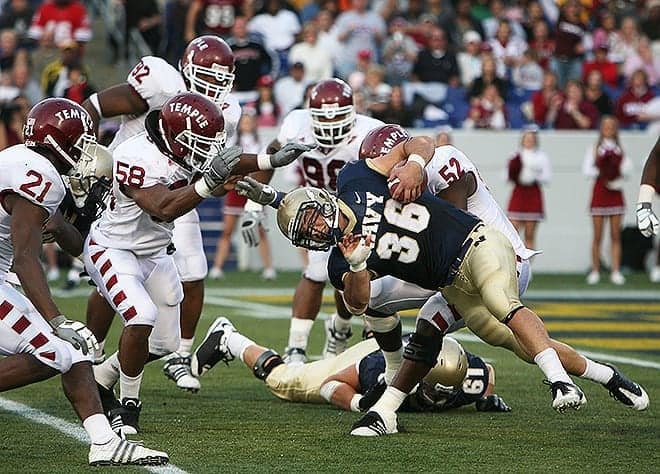Amateur to professional is quite the shift

author: konstantin kharitonov| Contributor

Just another field of dreams/U.S. Navy photo by Mass Communication Specialist David P. Coleman/Released)
Do you have what it takes?
“Where am I going to play next year?” A question most athletes are faced in their graduation years.
It can come so suddenly, almost as if it was without notice. While it can be hard at first, those that are devoted to their sport do eventually find their way. When devoted enough, those that succeed at the college level often do make their way toward the professional level. However, the transition, whether it be basketball, hockey, tennis, golf, football or any other sport, can be so vast, it is as if the sport has changed overnight.
The main difference that a lot of college athletes find in their first professional seasons is just how much faster the games are being played and with much more intensity. Don’t get me wrong, college sports are still very fast and very competitive, not just anybody is picked and allowed to play against the best college players in the world. All saying this, the pros levels are played at a significantly higher level, as they should be.
There are many different reasons for this. First off, professional players are paid. While wages and contracts are completely different and differ from sport to sport (but that’s a topic for a later day), the main point is there is a true incentive to play the game. Players now have to train harder, play smarter, and conduct their lives in a more professional manner because they are working. For a college-turned-pro football player, being a quarterback and throwing the ball down the field has evolved from a humble beginning to becoming his career and livelihood. So every check, every three-pointer, every tackle, every swing, is going to be that much more intense. And yet, it is done for the love of the sport.
That passion is what drives those who have played in their youth and what keeps them still driven in the pros. A message to all, if you want to continue playing professionally, you need to be passionate with what you are doing. Without it, there will be no effort, no motivation to achieve. Players are going to be bigger. They are going to be more physically fit, more mentally mature. This isn’t against your fellow young college students anymore; these are grown men and women who have strict diets and regulated training who don’t take anything for granted. When preparing in the professional leagues, there are not as many cheat days. Not to say that athletes don’t go out to have a meal at a restaurant or for some drinks, but it is much more important now to watch what goes inside the body. A person’s prime performance happens between the ages of 24-29, beginning right after the age most college players are going to be transitioning to the pros. To reach that peak, heavy training is invaluable. Another key aspect of the transition is time management. While in college, players have their sport and all the training to go along with it, their studies and classes, potentially any part time employment they might have on to with their own personal life to deal with. Once the jump to the pros is made, it can be just as hectic.
For example, the average salary for a CFL player is $80,000 with the minimum for a rookie being $50,000. This means on top of the time used on being a professional football player, the average CFLer usually has to find an additional career for the offseason. With two full-fledged careers, with personal life and other interests and ventures sprinkled in, life for a CFLer is one that takes a lot to manage. This is why it is so important to learn time management skills at the lower levels, because the responsibility only increases year after year. It is a lot to handle and it is definitely not for everyone, which is where the passion is needed once again. Those that are truly passionate will have their love of the game triumph over all the different stresses that their life can bring, up until the passion is not there anymore. In regard to stress, it does just come from one’s self. If you want to go pro, get ready to deal with the media. I mean, it is true that the media coverage is mostly situated for the highest of highest leagues, but there is still a decent media scene for the lower levels. Using the CFL as an example again, while it is nowhere near getting the same amount of coverage as the NFL receives, CFL players are still subject to interviews, media evaluation, and public appearances. A professional makes a living by playing the game. In turn, there are people who make a living commenting on their play, what that pro does on the playing field as well as what they do off the field. Because of this, there is a public image that must be maintained, even more so than ever before in college. While in school, a good representation of yourself is important to continue to have the approval of your coach and dean, but as a professional, your actions are judged by not only your team’s management and coaching, but by the public as well. Professionals are in the public’s eye much more than other professions (entertainment notwithstanding).There is a reason why a majority of pros have very boring interviews.
In total, it seems very daunting, becoming a professional sports player. Everything becomes much more intense, whether it be the speed of the game, the training, the dieting, the added responsibilities, the media interactions, every stress is magnified to a much higher degree. However, for those that have the passion for their sport, it is the most life fulfilling feeling that only a select few ever experience. To each their own. For the pros who get to do what they love for a living, what a life to live.









